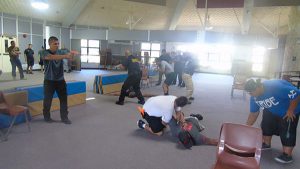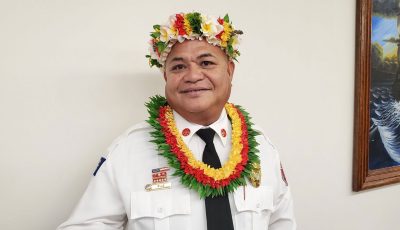Law enforcers learn how to deal with an active shooter

Twenty law enforcers in the CNMI undergo a five-day training on “first official response in a critical environment force course” conducted by the Chicago-based Controlled F.O.R.C.E. at the Pedro P. Tenorio Multi-Purpose Center in Susupe. The training included how to deal with an active shooter, like what recently happened at a Florida high school. (Ferdie de la Torre)
Twenty officers were recently trained on how to deal with an active shooting incident like what recently happened at a Florida school.
The officers, coming from different law enforcement agencies in the CNMI, went through a five-day training led by Tony Grano, reportedly one of the country’s most sought-after instructor trainers for counter terrorism, military combative, police arrest, and control tactics.
Grano, founder of Controlled F.O.R.C.E. Training Management Systems in Chicago, led the “first official response in a critical environment force course” training, along with instructor Nick Cassiano at the Pedro P. Tenorio Multi-Purpose Center in Susupe.
During the last day of the training last Friday, Grano said the training is to develop instructors’ skills, which they can later cascade to other officers.
Grano said they teach participants how to use force on non-compliant subjects, which means that a person wants to fight because he does not want to comply with an order.
Participants were also taught, among other things, self defense, dealing with an aggressive attack, and understanding about the level of force to be applied.
Grano said first responders should always be prepared on how to deal with active shooting incident like the recent shooting at a Florida high school.
“Once you receive a call about an active shooter, the objective is not to go and find the shooter, kill the shooter, or discharge the shooter. The objective is to save as many lives as we possibly can,” he said.
First responders should make good decisions in a short period of time, he said.
“Make a decision quickly, because the right decision will save a lot of lives. That’s why we are focused on decision-making, thinking, and applying,” he said.
Fire and Emergency Management Services Commissioner Claudio K. Norita said they sent a couple of their instructors to attend the training.
“We reached out to this company and we talked to all the various law enforcement agencies in the CNMI and we measure as to what level they’ve got with regards to instructors. Basically, it’s zero,” Norita said.
Aside from DFEMS, the participants are from the Department of Public Safety, Commonwealth Ports Authority, CNMI Marshal Service, and others.
Norita said they are trying to implement uniforms standards in all basic training.
The 40-hour course will not make the participants super instructors, Norita said, but the foundation is set. At the same time, it is economical for the CNMI to invite trainers to come here.
“As you can see, two instructors can certify 20 instructors. If you send two guys to the [United S]tates, it’s going to cost $20,000 in grants,” he said. “We want to train with the same set of music and same operations and standards.”
With the training, once marshals, police officers, or ports officers all arrive at the scene of an incident, they all know what to do, Norita said.
“We are trained on the same of set of music, same policy procedure,” he said, adding it makes for better and efficient law enforcers.
Doing things differently makes it problematic at the scene in a situation. “So this is uniformity. All of the CNMI law enforcement agencies are represented here,” Norita said.
He said the objective is to train every single law enforcers but at the same time they need to start with the instructors. “It’s a multiplier effect and brings the same message out to all our law enforcement agencies.”
Firefighter 2 John San Nicolas, who is assigned with DFEMS enforcement division, said the training is an eye-opener as it’s his first time to attend this kind of training. “I’m learning techniques,” he said as he cited, among other things, how they were trained to make a proper arrest.



























